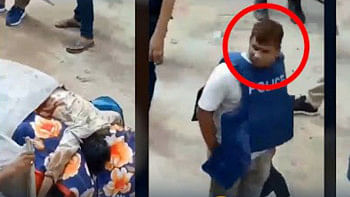Whither Thailand?
Thailand has been going through serious political turmoil for the last one week. On August 28, up to 35,000 demonstrators stormed a state-run television station, besieged at least three ministers, and finally invaded the grounds of Government House; stepping up a campaign to bring down Prime Minister Samak's administration.
The demonstrators remained in the Government House for six day. The Criminal Court has approved arrest warrants for nine people, as proposed by the police, including five People's Alliance Democracy leaders.
The leaders face four charges, among which the most severe is treason. The premier, who was working from army headquarters, said that his approach would be soft and gentle and that police would simply surround the seat of government until everyone had left. "If we get arrested, please don't follow us to the detention centre. If you leave the government house that means we have been defeated," said the protest leaders to boost the morale of the protesters.
As riot police moved in, leaders of the People's Alliance for Democracy vowed to stay inside the Government House compound until Prime Minister Samak Sundaravej bowed to their demands to step down. "The protest has already developed into a people's revolution. I do believe that Samak is going to resign," protest leader Sondhi Limthongkul commented.
Police have indicated that they will enter the compound to arrest the PAD member, but interior minister Kowit Wattana appeared to be holding out for a peaceful solution. "I ask the protestors of the PAD to please withdraw from the Government House compound immediately. You can rally somewhere else," he said. Despite government pleas, the threat of arrest, and even the onset of a tropical rainstorm, protest leaders refused to budge. "If you want to arrest us here, it is the government who must go," they said. Somsak Kosaisuk told the protesters, most of who were wearing yellow shirts, to show allegiance to revered King Bhumibal Adulyadej.
Correspondents saw hundreds of police, some with batons and shields, in the enclosure. The security forces appeared relaxed, watching the ongoing rally on the manicured lawns of the Government House.
Samak has won praise from Thailand's often-hostile English language press, with a poll showing that nearly 68 percent of Bangkok residents surveyed did not agree with the Government House siege.
They have broken the law and it could be a serious setback for them. The government has a lot of options. They still have time on their side. Some political analysts pass their comments as the following: Regular and peaceful demonstration hardly allows and recognises the siege inside the country's presidential house. The protest leaders must not cross the democratic norms.
Since taking office, Samak has faced a series of setbacks. Court decisions forced three top government officials to resign. The ongoing PAD protest has sent the stock market down nearly 18 percent.
The alliance wants to force the government of Prime Minister Samak Sundaravej to step down, accusing it of corruption and of serving as a proxy for former prime minister Thaksin Shinawatra who was ousted in a 2006 coup and faces several corruption cases.
After Thaksin was deposed in the bloodless coup, his party was dissolved and he was banned from public office until 2012. But Samak led Thaksin's political allies to a December 2007 election victory, and their assumption of power triggered fears that Thakisn would make a political comeback.
Thaksin still remains popular with the country's rural majority. It is said that he brought a revolutionary change in rural Thailand through various welfare steps for the farmers.
But the corruption, particularly in telephone companies, led him to face the present exile. The protesters say that Western-style democracy has allowed corruption to flourish in Thailand. They want a new government, with a parliament in which most of the lawmakers would be appointed and only thirty percent elected. Thaksin, who fled to self-imposed exile in Britain, faces an array of corruption charges.
The Chart Thai Party, a key member of Samak's six-party ruling coalition, said it was ready to suggest that Samak step down. The Thai parliament convened an emergency meeting on August 31 at the request of the prime minister, who understood and acknowledged that the administration could not control the spiralling anti-government protest.
Samak's People's Power Party said it planned to present a compromise in parliament to appease thousands of protesters who had remained in the President House till sixth day of their siege.
Samaks' six-party coalition government controls more than two-thirds of the seats in the 480-seat lower house. The coalition partners also say that the situation was deteriorating and that they were thinking of telling the prime mister to decide on the future of the government. But Samak Sundaravej is still adamant not to bow down to public will. He says that he can restore law and order in the country, despite protests spreading from Bangkok to the other regions and forcing three airports to close. At one point he angrily asked the protestors: "Who do you want as your next leader? Do you think that somebody will reward you or honour you?"
Bhumibol is the constitutional monarch of Thailand with no formal political role, but has repeatedly brought calm in times of turbulence during his 60 years on the throne.
Probably, this time also, he is going to play a heroic role. The country's influential army commander, General Anupong Paochinda rejected a request by Samak on August 30 to declare a state of emergency. Anupong has vowed that they army will not intervene. and has called for resolution of the crisis by political means.
It is indeed a good indication that the army does not want to embroil itself in the political turmoil of the country. It wants a people's government. That's good. It is time for Samak also to listen to what the people say.

 For all latest news, follow The Daily Star's Google News channel.
For all latest news, follow The Daily Star's Google News channel. 




Comments